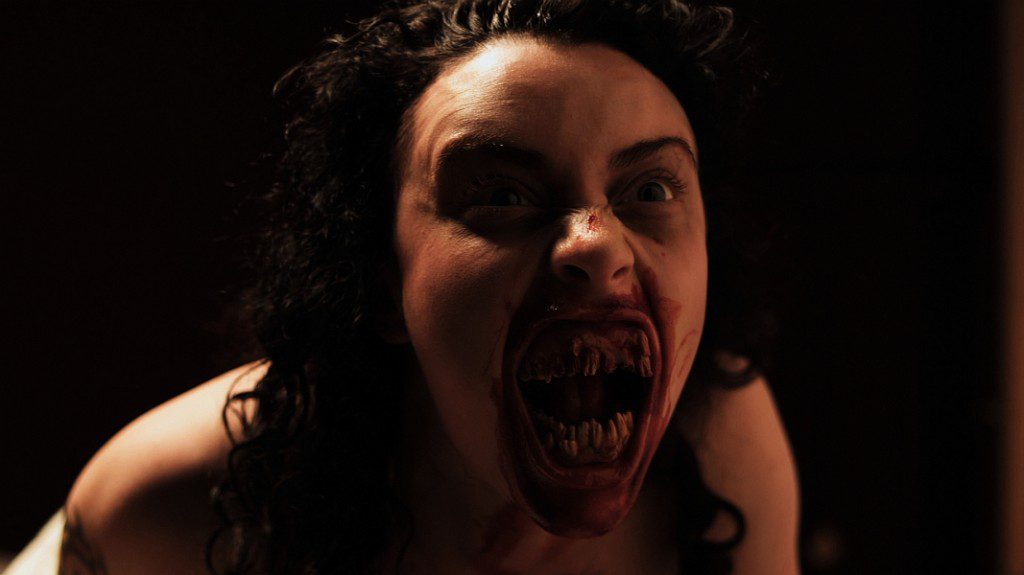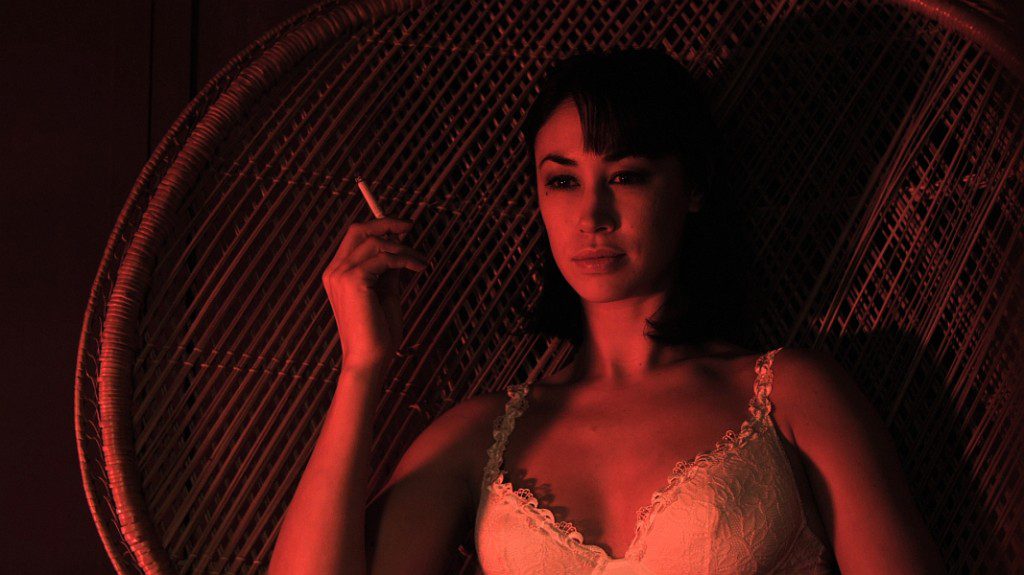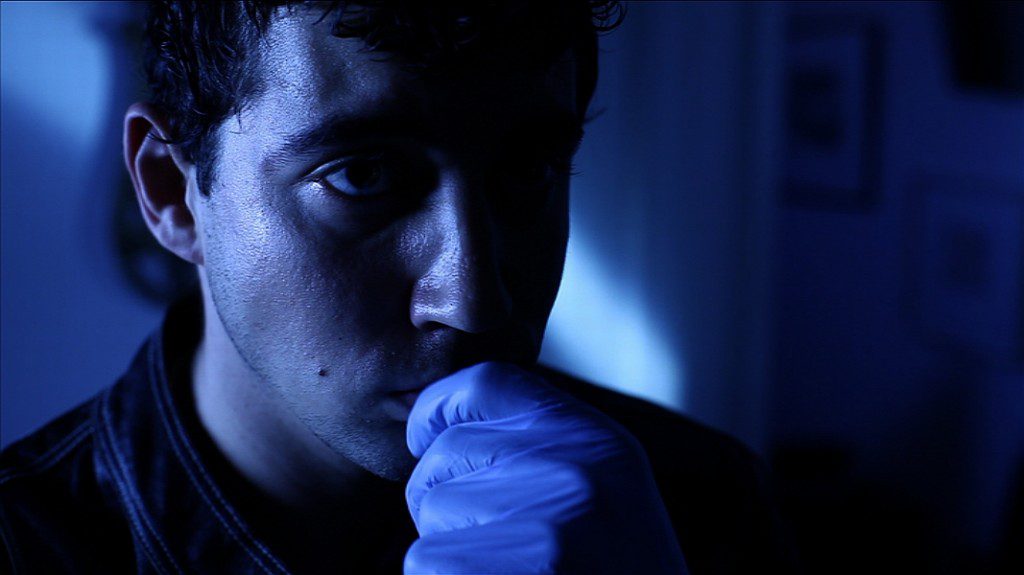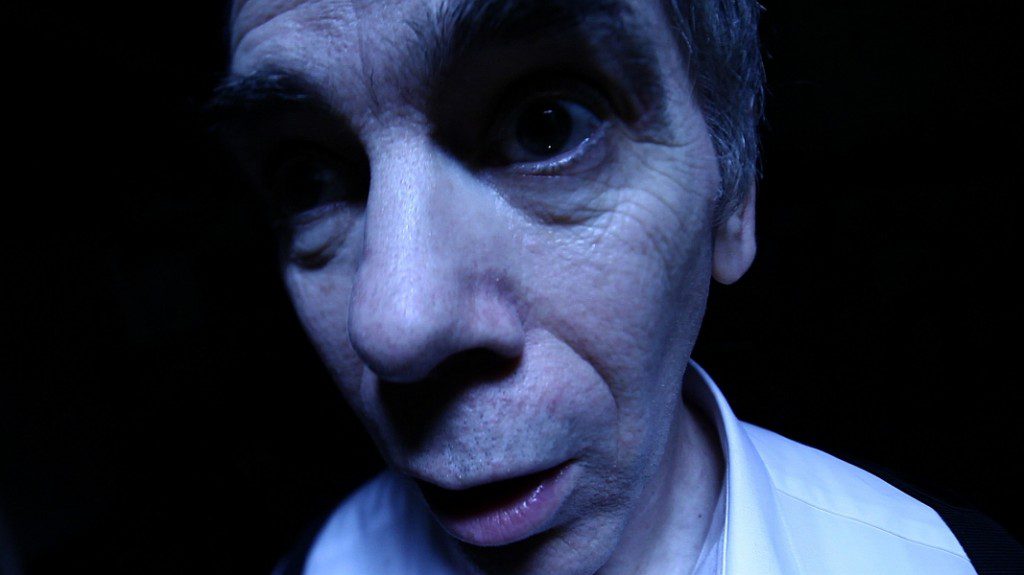The following interview/discussion should have taken place in a cosy pub over a few pints, but due to logistics it was conducted over a short period of time via email. The brief was for each of the subjects to interview the other, but in the format of an informal chat rather than a structured interview. This way the interview would be organic and find its own shape as things progressed.
We hope readers will find this insightful and interesting. Hogan and McMahon were delighted to be given the chance to moan about stuff and be miserable old men for a while.
Sean Hogan is the writer/director of Lie Still and The Devil’s Business, as well as House & Home, an episode of the anthology feature Little Deaths. He is currently producing Future Shock! a documentary on the UK comic magazine 2000AD, and developing his next feature, No Man’s Land.
Gary McMahon is the author of several short story collections and the novels Rain Dogs, Hungry Hearts, Pretty Little Dead Things, Dead Bad Things, The Concrete Grove, Silent Voices and Beyond Here Lies Nothing. His latest release is the novel The Bones of You.
 SEAN HOGAN: So I promise we’ll get into literary matters a little later on, but – perhaps selfishly! – I wanted to start by talking about film for a little bit first. For starters, we were first introduced purely because you’d seen my last film and liked it. And having just read the excellent Nightsiders, it seems like film must be a big influence on you. You describe the book as a homage to a certain strain of exploitation cinema, and I believe it also started as a screenplay? Certainly when I was reading the book it was very easy to envision it as a film, except for some of the more literary/meta elements that are introduced towards the end.
SEAN HOGAN: So I promise we’ll get into literary matters a little later on, but – perhaps selfishly! – I wanted to start by talking about film for a little bit first. For starters, we were first introduced purely because you’d seen my last film and liked it. And having just read the excellent Nightsiders, it seems like film must be a big influence on you. You describe the book as a homage to a certain strain of exploitation cinema, and I believe it also started as a screenplay? Certainly when I was reading the book it was very easy to envision it as a film, except for some of the more literary/meta elements that are introduced towards the end.
So, what was your first/formative genre influence – literature or film? I think I can see certain literary influences in your work but it also seems as though film must still play a big part for you.
GARY MCMAHON: That’s a tough question. But I knew you’d do that – if only to make me squirm. It’s hard to recall which came first, my love of genre cinema or genre fiction. I’d probably have to say film, though. My father was an artist. One of my earliest memories is of his sketch book, filled with portraits of Fu Manchu, Van Helsing, Dracula, Frankenstein…he loved the old Universal monster movies, westerns, gangster films, and naturally that was passed on to me. In terms of prose, I didn’t start reading horror seriously until I read Stoker’s Dracula when I was about ten, and that was only as a result of seeing the marvellous BBC adaptation with Louis Jordan as the Count.
SH: I’d imagine the same held true for me as well – if only because it’s easier to get your head around the Universal Dracula and Frankenstein than read the novels at 7-8 years old. But I did start reading horror early. As I recall, I was already onto King and Herbert by 10 or 11. I’m sure a lot of it went over my head – certainly my dad used to read them after me and raise an eyebrow at what I was being exposed to – but that early thirst was there. It does seem like it was in me from an early age, but I’ve no idea why.
To be honest, you often seem to have a higher opinion of a lot of recent genre films than I do, so I’m also interested to see what you think about the state of contemporary horror films in general and perhaps where you’d like to see them go in future.
GM: I love horror films. I’m much more forgiving of films than I am of novels or stories, possibly because I know how much interference there is to get one made. Someone making a half decent film often seems like some kind of minor miracle.
I think horror cinema is in a strange place at the moment. There are far too many shitty remakes of films that were crap in the first place, and when something good and original does slip through the net it’s ripped off mercilessly and then remade a couple of years later, perpetuating this cycle of cannibalising stories. There are signs that things might be improving – films like your own The Devil’s Business, made by people who refuse to follow trends. But these are few and far between.
SH: I actually have a terrible rep in certain circles as not liking any horror films made nowadays. It’s not true, but I will confess to being fairly picky (90% of everything being shit and all that). You’re right – it is a struggle and it is almost a miracle if anything decent gets produced, but I also don’t feel like a lot of horror films try hard enough. Part of it is that the business has a very low opinion of the genre in the main and just views it as a commodity – so all they’re interested in is ripping off what was successful last year – but part of it is also that the material isn’t good enough.
GM: I know you and I have discussed this before, but a lot of modern horror cinema seems to be terribly obvious and just a bit crap. There are exceptions of course – for example, I loved Sinister and Absentia – but these tend to be ones that sneak out under the wire. The majority of horror films seem to be made by people who have no idea how horror actually works – they don’t understand the dynamics of making something disturbing. A lot of scare scenes are the modern equivalent of chucking a car across the room in front of the camera to make people jump.
SH: Oh, absolutely. I recently saw The Conjuring and was infuriated by it. It actually has a decent buildup, with some well-staged scares, but degenerates into exactly the kind of thing you’re talking about. Essentially, it lacks the courage of its own convictions – it doesn’t trust the audience to find the subtle stuff scary, so resorts to a lot of sound and fury that signifies nothing but the director’s cowardice. And it’s so conservative – everything is resolved via good old fashioned religion and family values. Surely the point of horror is to undermine, to challenge – not to reassure? And yet the early reviews have all been massively positive, which suggests to me that the audience for modern horror want something different than I do.
GM: Regarding influences, I’d be interested in hearing yours. Last night I watched your first film, Lie Still. It seemed to me that I detected hints of Polanski in there (particularly The Tenant, and even Repulsion), but there are also elements of traditional ghost story at play. I also noted with interest that your films tend to have quite a formal look about them: the way you frame a scene, the composition and structure, have a lot in common with what I’d call classic filmmaking. There are no jump cuts, there’s a notable absence of the trendy shaky-cam. But there is an assured elegance at work. So far, your films have the claustrophobic, self-contained feel of stage plays. Is that a deliberate feel you’re going for, or is it simply due to budgetary considerations?
SH: As regards my stuff, and particularly Lie Still, certainly Polanski is a massive influence (hilariously, I was actually asked once whether I’d ever considered playing the lead a la Polanski in The Tenant). Polanski is a great classical filmmaker – much like Hitchcock, every cut or composition has a purpose – and as you’ve seen, something about that strikes a chord with me. I want the filmmaking to be like good prose – planned, structured, not just a bunch of coverage thrown together. I’ve never really had the time or the resources to achieve everything I want to do, but I’ve always tried to do the best I can with what I have. And obviously Polanski made a virtue out of claustrophobia in a lot of his early films, which is worth studying if you are limited in scope by your budget.
So yes, partly that claustrophobia is enforced by lack of funds, but also horror is a genre where that limitation will work for you. So I’ve always designed scripts that way, whilst also being aware that it serves my purpose in a financial sense. But I do want to get more expansive – the next project I’m hoping to do is set in the trenches of WWI, for instance.
Other influences? There are so many. Scorsese was always massive for me. I know how big a fan of Taxi Driver you are and that’s certainly on a list of films I’ll frequently rewatch before I shoot something (not to mention you have Paul Schrader involved there as well, who was a big scriptwriting influence for me). Val Lewton. Don’t Look Now. 70s horror in general, basically, as well as more classical stuff like The Innocents and The Haunting. I still think reading Stephen King at an early age taught me a lot. And as was pointed out so often on The Devil’s Business, Harold Pinter was someone I studied in terms of what you can do with writing dialogue.
What were your writing influences? It feels to me like Ramsey Campbell must have been a major figure for you.
GM: My literary influences are pretty varied. My favourite writer is Charles Bukowski. I love Ramsey Campbell – he writes horror that taps right into my mind and stays there. Clive Barker’s willingness to tackle imagery head-on and make a metaphor flesh was important to me when I first read him, and Stephen King’s gift for character. The American writer Dennis Etchison was probably the biggest influence on me in terms of my own writing. He’s kind of like the Raymond Carver of dark fiction. His stories are all low key, suggestive, and disturbing in ways that at first you just can’t pinpoint.
SH: And who do you still read now – what should I be looking out for?
GM: To be honest, horror fiction is the same. I rarely read modern horror fiction, other than by writers I know I can trust or books that are recommended by people whose opinions I trust. There seem to be a lot of horror writers who’ve read Stephen King and nobody else. They think the horror genre was invented in the 1970s. The best horror writers I know don’t set out to write something scary. They’re just writing a story they need to tell, and it happens to be dark and disturbing. I don’t trust writers who deliberately sit down to write something “scary”. They generally just copy something that’s gone before. I read genre authors like Ramsey Campbell, Joel Lane, Graham Joyce, Adam Nevill and Conrad Williams. Writers who I believe are making a personal statement with their horror. Or I’ll go back to Robert Aickman, M.R. James, Poe, and Blackwood. I also tend to stay away from all that zombie stuff. I’ve noticed a whole sub-section of genre writers who do nothing but zombie novels.
Films have always been a major influence for me, too. Like you, I grew up watching the Universal monster movies and the Hammer films on TV, and I love directors like Fritz Laing, Hitchcock, Herzog, Bergman, Scorsese, Fincher, Michael Haneke, and Shane Meadows. Recently I’ve really got into Ben Wheatley’s films.
SH: Of course, none of those are horror directors, although they’ve all ventured into the genre at some point. But like you, I try and look beyond the genre for influences, or at least try and widen the definition of what horror can be. A lot of what seem to me to be the great horror films of the last 10-20 years are not strictly what you’d call genre. Certainly David Lynch seems to me to be the most important horror director of recent times, but not many people would classify him as such. However it feels like the era of the great horror auteurs is over, at least for the time being…
GM: Yes, I think Lynch is making the best horror films out there, but they aren’t called horror films. Nothing scares me as much as Lynch’s work. It’s deeply, deeply unsettling. There are moments in Lost Highway, Mulholland Drive, Inland Empire and Eraserhead that I’ll never be able to forget. He taps into the essence of nightmare in a way that no horror director ever could. Bergman was capable of that, too. Through a Glass, Darkly, Cries and Whispers, Hour of the Wolf, the dream sequence in Wild Strawberries…astonishing stuff, and profoundly unsettling.
SH: Absolutely. I think we’re similar in that we’re both looking for that personal statement, whether it be in literature or film. I’m not interested in formula: I want to see what individuals can bring to a genre, how they can change or subvert it. Ben Wheatley – who I rate highly as well – is a director who does that. But there aren’t enough like him around, and part of me thinks it’s because the very nature of the industry prevents people like that coming through.
A lot of my frustration with filmmaking stems from the various hurdles you run into as a director: trying to get difficult material made, dealing with rampant financial dishonesty or industry snobbery about the genre (I’ve literally just had it questioned by the BFI as to whether I was the ‘appropriate’ choice of director for a film). But it seems to me you’re in a place where you can pretty much write what you want and get it published somewhere. I’m sure it’s not that easy, however!,
GM: I think it’s easier to get a book published than it is to get a film made, but even that’s problematic. Publishers are chasing trends, trying to hop on literary bandwagons. If you produce something that isn’t commercial, it forces you into a niche and the only publishers who’ll touch your book are the independents. That usually means low or no advances, and a limited print run. If you stop to think about it, you feel like giving up…so personally, I just write what I want to write and then worry about selling it. I’ve been lucky so far, but I still haven’t managed to pin down that big deal with a major publisher.
But I was speaking to Stephen Volk recently about the state of the film industry, and once again it struck me that it must be some form of small miracle that anything decent ever gets made. Meeting after meeting, all run by people who don’t even like, never mind understand, horror. Endless interference and “script notes” from people who are suddenly called experts despite not knowing anything. It all sounds pretty depressing.
Which modern horror films do you think have been any good, or at least interesting? I’ve sensed something of a shift towards the style of classic ghost stories (perhaps fuelled by the success of those banal Paranormal Activity films), but sadly not a lot of people seem to be able to pull it off. Can you see this return to reticence (rather than gore) being a long-term thing?
SH: Mostly it’s been the stuff coming out of Asia and subsequently Europe – Ringu, Kairo, A Tale of Two Sisters, Let The Right One In, Martyrs, Del Toro’s Spanish films, more recently Sleep Tight – or the US independent sector. Ti West is someone who seems to have the right attitude to horror and a reluctance to be pushed around by Hollywood. JT Petty is also someone to look out for – I thought The Burrowers was excellent – but I suspect he faces the usual problems getting offbeat genre films made. Larry Fessenden is obviously a great force, both as a director and a producer. Session 9 seems to have started getting its due in recent years. Certainly I loved Kill List, although I can’t see Wheatley ever letting himself be pigeonholed as a genre director. Most recently I was a huge fan of Only God Forgives, which seemed to me to be a horror film in the same way that Taxi Driver is.
But it’s always the independents, you rarely get anything interesting coming out of the studio system anymore. It’s just too corporate. I actually don’t mind the Paranormal Activity films – as studio genre franchises go, they seem to me to be entirely preferable to most of the junk that gets pushed our way. I suppose it’s because they hearken back to an earlier style of horror – they remind me in many ways of some of the great UK TV horror productions, in which the lack of money and resources becomes an asset. The writing could certainly be deeper/better, but I’d still rather watch one of those than anything by James Wan.
The reticence thing is interesting. For starters, I’m not sure most of these films are actually that reticent. They pay lip service to subtlety, but more often than not they ultimately resort to ladling on musical stings and VFX in much the same way as earlier horror films relied on gore. I think you’d have amazing trouble trying to make something truly reticent within that system, which seems to prize pure sensation over anything else. But horror is always cyclical – eventually this will run its course and we’ll be back to monsters or gore or whatever.
What about you? You mentioned Sinister (which I was mixed on overall, although I appreciated its willingness to go where it did) and Absentia (which I still haven’t seen). Has much else made an impression in recent years? And given the current state of the horror movie, where do you see it going from here? Are we going to end up in a similar state to genre publishing, where the interesting work is driven underground by economics, ie for small presses substitute VOD/streaming?
GM: You’ve basically listed most of the films that have impressed me above. I’d add Lake Mungo, Noroi: the Curse, and a few others. I’ll mention your own The Devil’s Business again here, because that really impressed the hell out of me with its combination of great dialogue, seedy British crime and Hammer-style horror.
I always get stick for this, but I’m still fond of the “found footage” thing, and think there’s still a lot of mileage in that particular sub-genre. You’ll probably disagree, but I thought Rob Zombie’s Lords of Salem was very good. Park Chan Wook makes great, iconoclastic horror films. I’m really looking forward to seeing Stoker, his first American film. Snowtown is a film that disturbed me a great deal. I’d call it a horror film, in the truest sense of the word.
I also recently stumbled on the phenomenon of Marble Hornets, a series of genuinely creepy straight-to-Youtube horror shorts incorporating the recent “myth” of Slenderman.
Creepypasta is also a great source of online horror: lots of weird short films and supposedly cursed or haunted film clips. I actually see these guerrilla-type methods of filmmaking as a possible future for horror. The studios don’t know what to do with the genre, but there seems to be a bunch of young renegades out there doing their own thing. Maybe the internet will herald a new era in horror. Shades of Videodrome, but via the medium of computer rather than cable television: long live the new flesh?
SH: You could well be right. I doubt it’ll be long before enterprising producers begin to snap people up from those kind of sites: better that than some promo director who just wants to make their first feature and doesn’t know/care about horror anyway!
So despite it all, there is always work to look out for in the genre, or perhaps just outside it. A lot of it might be hackwork or garbage, but I’m not sure that hasn’t always been the case, to some degree. And let’s face it, if a couple of surly bastards like you and me can find enough to keep ourselves entertained, then all hope is not lost…
If you enjoyed our interview exchange between Sean Hogan and Gary McMahon, please consider clicking through to our Amazon Affiliate links and buying their fiction and films. If you do you’ll help keep the This Is Horror ship afloat with a very welcome slice of remuneration.
Buy Gary McMahon fiction (UK)
Buy Gary McMahon fiction (US)
Buy The Devil’s Business (UK)
Buy The Devil’s Business (US)













